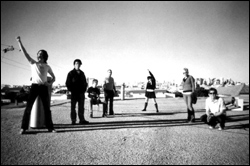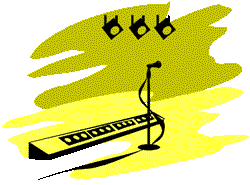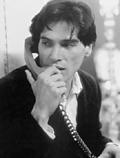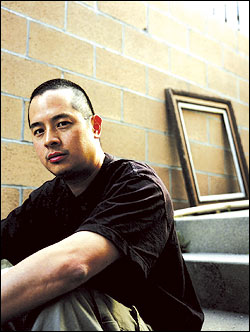The most difficult task in local music may well involve seven-piece discoids United State of Electronica. Not seeing them—they gig frequently in and around Seattle (Bellingham is also a stronghold), and this week they even play twice. Not hearing them—those two shows are to celebrate-slash-promote their self- released, self-titled first album, which reprises all of their three-song EP, U.S.E., a local-shop fixture for the past year. And certainly not enjoying them—live, they’re gloriously loose, or at least as loose as you can be with a rhythm box, which accompanies all the band’s live shows, keeping your notes and moves steady. Impressively, the new album is just as fun.
No, the difficulty lies with the band’s name, which apparently gives some people hives—”I hate it,” hissed through clenched teeth, is a typical response. Me, I love it, because I am a hopelessly corny fuck who came of age listening to rave compilations with titles like Only for the Headstrong and Ravin’ USA. The reason I wanted to hear the band in the first place was in fact because United State of Electronica sounded like the title of an early-’90s Moonshine Music comp.
The name, at least at first, was “a total joke,” according to Jason Holstrom, U.S.E.’s tall, sandy-haired, scratchy-voiced, 27-year-old guitarist. Noah Starweaver, the band’s rooster-haired 25-year-old keyboardist and vocalist, elaborates: “There was no intention of starting a new project. Me, Jason, Jon [E. Rock, 28, the band’s drummer and rapper], and Peter [Sali, 27, guitarist] had been playing music for eight years—we’re in another band called Wonderful, and U.S.E. sprang up while we were working on a Wonderful album. When we decided to play a show, we kept our names secret—using secret IDs, saying we were from Manheim, Germany. It’s a corny name, but it’s also a very practical name. You can use us for starting parties and having fun. Our music is functional. And U.S.E. is easy to chant.”
So far, most of that chanting has been done in rock clubs. This makes sense, given the musicians’ non–U.S.E. pedigree—in addition to Wonderful, 19-year-old singer Carly Nickalaus fronts the Catch. (Indeed, only singer Amanda Okonek, 23, doesn’t have another band in addition to U.S.E.) And even with a drum machine, the Vocoder Starweaver sings all his parts through, and Jon E. Rock’s goofball rapping (whose major MC influence seems to be not Rakim or Biggie, but Turbo B of Snap!, famous for 1990’s “The Power”), U.S.E. onstage are configured very much as a rock band. But despite several band members’ pronounced taste for playing smallish house and frat parties, their music seems like it would be equally, if not more, at home at a rave or dance club. “It would be good to get to the dance side a little more,” agrees bassist Derek Chan, 28. “It’s a little far-fetched to play raves, though, because of the [stage] setup. Sometimes, though, we’ll get people like the kid in Tacoma who came out in full raver gear.”
But while U.S.E.’s most ardent fans have been converted through their live show—Holstrom notes that there are “some kids who have seen us 20 times” in the band’s two-year history—they’ve also gotten hearty feedback from the dance community. “We sent our CD to Force Inc.,” says Chan, referring to the highly respected Frankfurt techno label, “and their president, Achim [Szepanski], told us he really liked it. But their distributor [EFA] just went bankrupt, so we’re holding off on that for now. And Luomo wanted to meet us—that’s why we were out at that show the other night.”
Chan is referring to a recent Chop Suey show where I first met most of U.S.E. In the wake of New York band the Rapture’s 2002 breakthrough 12-inch single, “House of Jealous Lovers,” “dance-rock” has become a fallback position for indie kids who want a little more out of life than oblique whining about their most recent breakups as their guitars go out of tune. The problem with this is that oftentimes the things that make disco great—sexual forthrightness, rhythmic exuberance, vocals that don’t mince around, the recognition that strict adherence to formula can often set you freer than rugged individualism, shamelessness—are alien to the agenda indie rock has set for itself ever since Pavement codified that sloppy equals good for a healthy number of semi-alienated college students at the turn of the last decade. Adding half-assed, four-on-the-floor beats to run-of-the-mill indie—or even worse, “going electroclash”—doesn’t answer anyone’s problems, and the first time I saw U.S.E., I spent the first half of the set skeptical. Needless to say, I spent the second half dancing. Joke name or no joke name, these guys meant it—phew.
“For people coming from the rock side, we’re hoping to get them dancing to electronic beats,” says Starweaver. “Our popularity has pretty much been word- of-mouth. We definitely work our asses off, but there’s something in the music that people want to tell their friends about. The phenomenon of the crowd moving, pumping their fists, getting sweaty, took a good six months to a year to happen. At least in rock clubs, people are not expecting to go and get sweaty. But when there’s seven people freaking out onstage . . . .”
“The party’s already there,” says Holstrom.
United State of Electronica play the Hideaway at 9 p.m. Thurs., April 1, and a CD release party at the Crocodile Cafe with Bethurum Collective and DJ Matt Nichols at 9 p.m. Sat., April 3. $8.








